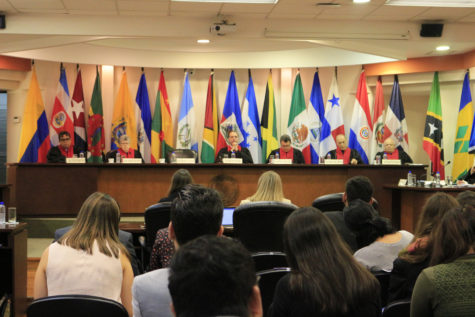
Credit: CorteIDH via Flickr
The Inter-American Court of Human Rights (IACtHR) has published a new agreement providing public access to certain documents submitted to the Court in relation to decided cases. [IACtHR Press Release] Specifically, the Court will now publish on its website briefs and other information on compliance with its ordered guarantees of non-repetition (whether these are submitted by the parties or by other entities or experts), as well as amicus curiae briefs, submitted during the judgment implementation phase. See I/A Court H.R., Court Agreement No. 1/19, Clarifications in Relation to the Publication of Information Contained in the Files of Cases at the Stage of Monitoring Compliance with Judgment, 11 March 2019.
While the IACtHR has long published its own orders on compliance with its judgments, it has not previously published the parties’ briefs or other submissions regarding compliance. And, while the Court publishes the parties’ “main briefs” from the merits phase, it does not publish amicus curiae briefs related to the merits. Importantly, the Court’s orders on compliance with its judgments already refer to and quote from the information it receives from the parties and others; the major change of this new policy is that the public will have direct access to submitted documents and briefs themselves, at least with regard to guarantees of non-repetition. The Court may implement the new agreement retrospectively, to publish the relevant briefs received in prior years. See id.
Court’s Agreement
The Court’s agreement to publish additional information presented during the monitoring compliance stage of a case makes two changes to the Court’s online publication practices. See id. Pursuant to this agreement, the IACtHR will now publish parties’ submissions on their implementation of the Court’s orders regarding “guarantees of non-repetition.” See id. at para. 1. Guarantees of non-repetition are a component of reparations, or remedies, sometimes ordered by the Court, with the goal of preventing future human rights violations; they can include human rights training for law enforcement agents, for example. The parties must submit this information separately to the Court because their submissions on implementation of other reparations ordered in the same case (for example, monetary compensation) will not be published. See id. at paras. 1-2. When monitoring compliance with a judgment, the Court will continue not to publish submissions it receives related to these other forms of reparations, which tend to be more victim-specific, unless there is a “duly justified request” and the President of the Court, after considering the parties’ opinions, decides to publish that information. See id. at para. 2.
The IACtHR will also publish the amicus curiae briefs, also known as third-party intervention briefs, submitted at the monitoring of compliance stage of the proceedings, along with documents submitted by experts and other non-parties to the case that are relevant to a State’s efforts to implement non-repetition guarantees and are submitted pursuant to Article 69 of the Rules of Procedure of the Inter-American Court. See id. at paras. 3 – 4.
For cases currently at the stage of monitoring compliance with the judgment, the new policy came into force on the date of the agreement’s publication. See id. at para. 5. Thus, all information and updates on guarantees of non-repetition submitted by the parties, including States, victim representatives, and the Inter-American Commission on Human Rights (IACHR), must now be submitted separately in accordance with the guidelines in the agreement. See id. at paras. 1, 5. For reports and briefs presented prior to the publication of the agreement, the President of the Court has the option to authorize their publication. See id. at para. 6.
To ensure that the new guidelines are widely disseminated, the agreement directs the Secretariat of the IACtHR to communicate this agreement directly to all parties of cases currently at the monitoring compliance stage and to disseminate this information via social media. See id. at para. 7.
The Inter-American Court of Human Rights
The Inter-American Court of Human Rights is the judicial organ of the Inter-American human rights system. It is composed of seven independent judges who are nominated and elected by States through the Organization of American States (OAS) General Assembly. IJRC, Inter-American Human Rights System. The IACtHR decides cases brought against OAS Member States that have specifically accepted the Court’s contentious jurisdiction. See id. Currently, 20 States have opted to accept the Court’s contentious jurisdiction in accordance with Article 62 of the American Convention. The Inter-American Commission on Human Rights must first process cases before they can be submitted to Court. See id. Only States parties and the Commission may refer contentious cases to the Court. See id.
Monitoring Compliance Stage
The IACtHR’s procedure for monitoring compliance with its judgments and other decisions is outlined in the Rules of Procedure of the Inter-American Court. This process involves receiving and evaluating State reports submitted and also the victim’s or victim’s legal representative’s response to those reports. See I/A Court H.R., Rules of Procedure of the Inter-American Court of Human Rights, November 2009, at art. 69(1). The IACtHR may request additional information from experts and other sources to assist its work in evaluating the information it receives, and may also may call for hearings involving the State, the victims, and the Commission. See id. at arts. 69(2), 69(3). After gathering all relevant information, the IACtHR will determine the status of the parties’ compliance and issue orders outlining future action to be taken. See id. at art. 69(4).
Additional Information
For more information about the Inter-American Court of Human Rights and the Inter-American human rights system, visit IJRC’s Online Resource Hub. To stay up-to-date on international human rights news, visit IJRC’s News Room or subscribe to the IJRC Daily.
